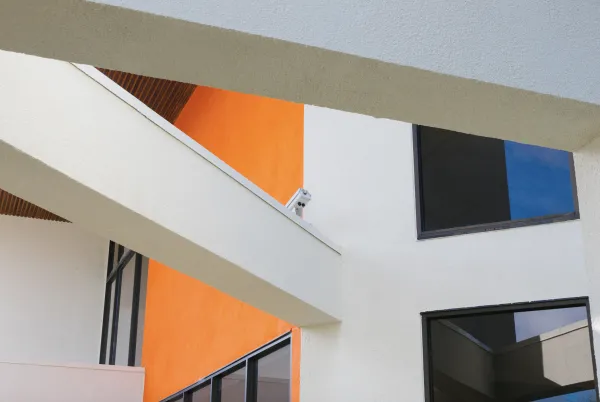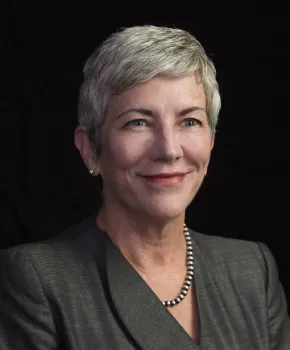Kyle Lewis
Lewis’ research on team performance and innovation is published in premier scholarly journals and has received international recognition. She teaches courses in leading people, managing diverse teams, and collaborative innovation. Lewis also has experience in technology ventures as a software engineer, product manager, and technology strategy consultant.
Lewis received her early training at Duke University, where she earned degrees in both Computer Science and Mathematics. Later she attended Carnegie-Mellon University, where she completed her M.S. in Industrial Administration, followed by her Ph.D. in Management from the University of Maryland.
Prior to joining UC Santa Barbara, Lewis was a Professor of Management and Faculty Director of the Master of Science in Technology Commercialization (MSTC) in the McCombs School of Business, at the University of Texas at Austin.
Dr. Lewis studies how organizations leverage individual and collective knowledge. She examines the performance of teams, especially those teams engaged in knowledge work such as professional services, new product development, science and engineering, and project-based tasks. She has published articles in Management Science, Academy of Management Review, Academy of Management Journal, Organization Science, Journal of Management, Organizational Behavior and Human Decision Processes, and
Group Dynamics. Lewis served as a Division Chair in the Academy of Management, Senior Editor for Organization Science and Associate Editor for Management Science.
Lewis has professional experience in technology strategy, designing and implementing information systems, AI product management and human resources management.

New Research on Teams
Teams with a learning, versus performance, orientation perform better. Members of those teams also learn more about their task.
Managerial Implications: Give your teams a "learning goal," and not just "performance" or outcome goals. Think about: how might learning on this project/task be applied to other tasks? How can what teams learn be leveraged for higher organizational performance? Measure those things, and motivate team members to learn!
Published in: Organization Science, 2020
Niranjan S. Janardhanan, Kyle Lewis, Rhonda K. Reger, Cynthia K. Stevens (2020). Getting to Know You: Motivating Cross- Understanding for Improved Team and Individual Performance. Organization Science 31(1):103-118.

New Research on Learning
Team and organizational learning can be disrupted by technological and organizational change. Disruptions can be lengthy and costly, as organizations try to unlearn obsolete information, learn new information, and respond and adapt.
A simulation model of team and organization learning suggests that disruptions that dismantle the structure in a team (e.g., gaining or losing team members; reorganization), are most damaging to long-term productivity. Disruptions that require organizational members to learn about a new technology are less costly and may be beneficial
Managerial implications: When a team or organization faces a technological disruption, keep organizational structures and team structures relatively stable. If structures must change, long-term performance might be improved by giving teams "new" tasks that require members to generate new knowledge about their team and teammates.
Published in: Organization Science, 2015
Anderson, E.A., & Lewis, K. (2015). A Dynamic Model of Individual and Collective Learning Amid Disruption. Organization Science 25(2): 321-652.
This paper was awarded the Jay Wright Forrester award for most impactful paper in Systems Dynamics, in 2018.

New Research on Artificial Intelligence
Teams are increasingly using artificial intelligence to help them perform tasks. However, we do not yet know how using AI affects how team members work together and perform.
A study underway examines how using a simple Intelligent Personal Assistant (IPA) can disrupt team processes and performance. Our research group found that teams using using an IPA were less likely to consult team members, even when those members possessed knowledge that the team needed. Teams using an IPA were also less likely to develop "shared cognition," which prior research has shown is important to long-term performance. The research, funded by the Army Research Laboratory and the Army Research Institute, is nearing completion.
Publications (Peer Reviewed)
Janardhanan, N., Lewis, K., Reger, R., Stevens, C. (2020). Getting to know you: Motivating cross-understanding for improved team and individual performance. Organization Science.
Carter, S., Carlson, S., Crockett, J., Falk-Krzesinski, H. J., Lewis, K., Walker, B. E. (2020). New directions spotlight: The research development professional. In K. Hall, Vogel, A. & Croyle, R. T. (eds), Strategies for Team Science Success. Springer: London U.K.
Anderson, E. G., & Lewis, K. (2019). Modeling group and individual learning: Lessons for integrating disciplines and agile research. System Dynamics Review, 35(3), 112-139.
Anderson, E. G., Lewis, K., & Ozer, G. T. (2019). Combining stock-and-flow, agent-based, and social network methods to model team performance. System Dynamics Review, 34(4), 527-574.
Marques-Quinteiro, P., Curral, L., Passos, A., Lewis, K., & Gomes, C. (2018). How transactive memory systems and reflexivity relate with innovation in healthcare teams. Analise Psicologica., 37(1), 41-51.
Bachrach, D. G., Lewis, K., Kim, Y., Patel, P. C., Campion, M. C., & Thatcher, S. M. B. (2018). Transactive memory systems in context: A meta-analytic examination of contextual factors in transactive memory systems development and team performance. Journal of Applied Psychology, 104(3), 464-493.
Olabisi, J., & Lewis, K. (2018). Within- and between-team coordination via transactive memory systems and boundary spanning. Group & Organization Management, 43(5), 691–717.
Mei, W., Friedkin, N., Lewis, K., & Bullo, F. (2018). Dynamic models of appraisal networks explaining collective learning. IEEE Transactions on Automatic Control, September, 2898-2912.
Williams, J. & Lewis, K. (2016). Leading effective teams. Women’s Leadership edge: Center for WorkLife Law, UC Hastings Law School. (Monograph)
Herndon, B. & Lewis, K. (2015). A sequence methodology perspective on studying dynamism in teams. Organization Psychology Review, 5(4), 318-332.
Anderson, E. & Lewis, K. (2014). A dynamic model of individual and collective learning amid disruption. Organization Science, 25(2), 356-376. (Authorship order is alphabetical.).
Hood, A. C., Bachrach, D. G., & Lewis, K. (2014). Transactive memory systems, conflict, size and performance in teams. Journal of Leadership, Accountability and Ethics, 11, 11-24.
Bachrach, D., Hood, A., Lewis, K., & Bendoly, E. (2014). The other side of the coin: Transactive memory systems and the prevention of resource losses. Academy of Management Best Papers Proceedings, Philadelphia, PA.
Lee, J., Bachrach, D., & Lewis, K. (2014). Social network ties, transactive memory, and performance in groups. Organization Science, 25(3), 951-967.
Marques-Quinteiro, P., Curral, L., Passos, A., & Lewis K. (2013). And now what do we do? The role of transactive memory systems and task coordination in action teams. Group Dynamics, 17(3), 194-206.
Lewis, K. & Herndon, B. (2011). Transactive memory systems: Current issues and future research directions. Organization Science, 22(5), 1254-1265.
Huber, G. & Lewis, K. (2011). Cross understanding and shared social theories. Academy of Management Review (Dialogue), 36(2), 422-424.
Huber, G. & Lewis, K. (2010). Cross understanding: Implications for group cognition and performance. Academy of Management Review, 35(1), 6-26.
Lewis, K. & Huber, G. (2008). Cross understanding: Effects on group cognition and performance. Academy of Management Best Papers Proceedings, Anaheim, CA.
Lewis, K., Belliveau, M., Herndon, B., & Keller, J. (2007). Group cognition, membership change, and performance: Investigating the benefits and detriments of collective knowledge. Organizational Behavior and Human Decision Processes, 103(2), 159-178. ** lead article.
Goldman, B., Gutek, B., Stein, J., & Lewis, K. (2006). Employment discrimination in organizations: Antecedents and consequences. Journal of Management, 32(6), 786-830.
Lewis, K., Lange, D., & Gillis, L. (2005). Transactive memory systems, learning, and learning transfer. Organization Science, 16(6), 581-598.
Winner, Best Paper of Managerial and Organizational Cognition Division.
Lewis, K. & Huber, G. (2005). A theory of the effects of cross-understanding and mental model dissimilarity on workgroup outcomes. Academy of Management Best Papers Proceedings, Honolulu, HI.
Lewis, K. (2004). Knowledge and performance in knowledge-worker teams: A longitudinal study of transactive memory systems. Management Science, 50(11), 1519-1533.
Lewis, K. (2003). Measuring transactive memory systems in the field: Scale development and validation. Journal of Applied Psychology, 88(4), 587-604. ** lead article
Lewis, K., Gillis, L., & Lange, D. (2003). Who says you can't take it with you? Transferring transactive memory systems across tasks. Academy of Management Best Papers Proceedings, Seattle WA.
Masterson, S.S., Lewis, K., Goldman, B.M., & Taylor, M.S. (2000). Integrating justice and social exchange: The differing effects of fair procedures and treatment on work relationships. Academy of Management Journal, 43(4), 738-748.
Lewis-McClear, K. & Taylor, M.S. (1997). Not seeing eye-to-eye: Implications of discrepant psychological contracts and contract violation for the employment relationship. Academy of Management Best Papers Proceedings.
Locke, E.A., Lewis-McClear, K., & Knight, D. (1996). Self-esteem and work. In International Review of Industrial and Organizational Psychology, vol. 11, C.L. Cooper and I.T. Robertson (Eds.). New York: John Wiley & Sons Ltd.
Jay Wright Forrester Award Presented to Technology Management Program Chair (2018)
Kyle Lewis, chair of the Technology Management Program at UC Santa Barbara, has received the highest honor for research involving system dynamics. The System Dynamics Society presented Lewis and Edward G. Anderson, a professor at University of Texas, Austin, with the Jay Wright Forrester Award for their paper “A Dynamic Model of Individual and Collective Learning Amid Disruption,” which was published in Organizational Science in 2014. The award dates back to 1983, but has only been given only five times in the past decade.
“It is an honor to be recognized for making an impact in organizational research with the use of system dynamics,” Lewis said. “The award is a testament to the high-quality and innovative work and research produced within TMP and the College of Engineering.”
System dynamics is a computer-aided approach to modeling phenomena that occur over time with feedback. It applies to problems that arise in complex social, managerial, economic, or ecological systems. System dynamics uses mathematical modeling and stresses a continuous view in order to find underlying patterns of policy and behavior.
Lewis and Anderson modeled the effects of disruptive events on learning and productivity in organizations at the individual and collective levels. They simulated the impact of events on productivity and performance, such as employee turnover, technological innovation, reorganization, and natural disasters.
“By simulating logic with mathematical reasoning, we were able to find patterns, supported by data, that you would not have observed directly,” said Lewis.
They found that collective and individual learning initially complement each other with respect to collective performance, but over time interact in complex ways. One implication of their results is that organizations that depend on expertise, knowledge, and knowhow as factors of production must consider how and when knowledge becomes embedded in collective structures – and not simply focus on individual employee learning and knowledge.
“The simulation results further show that dismantling organizational structures, such as teams and groups, can dramatically and negatively affect overall performance,” added Lewis. “Once collective structures are impacted, collective learning must begin again before performance can increase.”
Lewis and Anderson continue to use learning curves to model organizational phenomena and to answer questions about who in a hierarchy must possess more generalized versus specialized knowledge and under what conditions.
Keynote Presentation at UC TECH / UC-wide Gathering for IT professionals July 2019 University of California, Santa Barbara
Professor and Chair Kyle Lewis Gives Keynote at UC Tech / UC-wide Gathering for IT Professionals
Technology Management Professor and Chair Kyle Lewis Keynote at UC Tech
UC Tech is a two-day conference for UC technologists to share and learn as well as network with colleagues. Technology Management Professor and Chair Kyle Lewis presented the 2019 keynote, "IT Ingenuity Put to Work: Organizational Strategies for Interrupting Bias." View the full presentation below.
UCSB Alumni Weekend Presentation 2018
Dr. Kyle Lewis presented on Building Strong Teams as a part of the Gaucho Grown Showcase. The showcase featured breakout sessions highlighting different industry groups and campus experts and concluded with an engaging fireside chat with Co-Founder and Chief Purpose Officer from the Honest Company, Christopher Gavigan '97.
How organizations leverage individual and collective knowledge. She examines the performance of teams, especially those teams engaged in knowledge work such as professional services, new product development, and project-based tasks
Chronological and Comprehensive List of Invited Lectures
Oct / 2016
“Teaming and collective intelligence”[1]
CREDITS (The Center for Research, Excellence and Diversity in Team Science) - Monterey, CA
“We haven’t seen her science yet”[2]
Bias Interrupter Working Group Meeting - Charlottesville, VA
Nov / 2016
“Collective intelligence in human groups”
CSU System – Leadership Retreat (CSU Chancellors/Provosts, Deans) - Oakland, CA
Dec / 2016
“Interrupting implicit bias and teaming: Research & practice”[3]
UCSB Human Resources departments - Santa Barbara, CA
Feb / 2017
“The science of bias and bias in science”[4]
BREN “Mind the Gap” organization, UCSB - Santa Barbara, CA
Apr / 2017
“Interrupting Bias in Organizations[5]
Family Service Agency (Santa Barbara County) - Lompoc, CA
May / 2017
“Team diversity & collective intelligence” and second presentation “Working in Teams Practicum”
CSU – Channel Islands, Student-Faculty research teams - Camarillo, CA
Jun / 2017
“Analogical reasoning in creative groups” (Lewis, K., Beyer, M.)
Unknowables Conference, UC Irvine - Irvine, CA
Sept / 2017
“Team Diversity & Collective Intelligence” and second presentation “Working in Teams Practicum”
CREDITS (The Center for Research, Excellence and Diversity in Team Science), Lake Arrowhead Conference Center, CA
“Effective teaming: Learning from research and practice” (Presenter & facilitator: Lewis)
CSU – Los Angeles, Leadership development for campus leaders retreat (Provosts, Deans, Department Chairs, Associate Deans, Assistant Deans) - Los Angeles, CA
Nov / 2017
“Technology Management Program”
Corporate Affiliates Meeting - UCSB
“Effective teaming and collective intelligence”
Women in IT group, (UCSB staff), Santa Barbara, CA
Feb / 2018
“Making Science, Engineering, and Entrepreneurship More Inclusive”[6]
UCSB Trustees, Santa Barbara, CA
“Women and STEM careers”[7]
FLIR Systems, Women’s Leadership Group Retreat - Goleta, CA
Mar / 2018
“Team performance and collective intelligence”
Graphiq Corporate Headquarters, Carpinteria, CA
“Team performance and collective intelligence”
Apeel Sciences - Goleta, CA
“Diversity in STEM”[8]
Apeel Sciences, Goleta, CA
Apr / 2018
“Building strong teams: Research-based tools that really work”
UCSB Alumni – All Gaucho Reunion - Santa Barbara, CA
“Collective intelligence and effective teaming”
CSU – Los Angeles, CSU Faculty Retreat - Los Angeles, CA
“Effective teaming: Learning from research”
UCSB Chemical Engineering Graduate Students, Santa Barbara, CA
Spring Insight: “Technology Management – Business and Entrepreneurship Education at UCSB”
UCSB Spring Insight, Santa Barbara, CA
Jun / 2018
Featured speaker: “Effective teaming: Practical insights from research”
“High water mark for the number of participants in audience,” (~350) according to event organizers, Annual Townhall
UC-IT (Information Technology Professionals and Leaders at the University of California) - Santa Barbara, CA
Sept / 2018
“Team diversity & collective intelligence”[9] second presentation “Working in Teams Practicum” (Presenter & facilitator: Lewis)
CREDITS (The Center for Research, Excellence and Diversity in Team Science) - Lake Arrowhead Conference Center, CA
Oct / 2018
“The science of bias and bias in science”[10]
Cottage Hospital System, Residents and Faculty - Santa Barbara, CA
Nov / 2018
“Technology Management: Exploring technological and social systems”
Corporate Affiliates Meeting, UCSB
Apr / 2019
“Teaming: Learning from research and practice” (Presenter & facilitator: Lewis)
CSU – Channel Islands, Faculty – Student research teams - Camarillo, CA
May / 2019
“Working in Teams Practicum” (Presenter & facilitator: Lewis)
National Organization for Research Development Professionals (NORDP) - Washington, DC
“Diversity and Teaming”[11] (Plenary panel speaker: Lewis)
National Organization for Research Development Professionals (NORDP) - Washington, DC
July / 2019
Distinguished Speaker (Keynote)
“IT Ingenuity put to work: Organizational strategies for interrupting bias”[12]
UCTech 2019 (Annual conference of University of California Information Technology Employees and Leaders) ~800 attendees - Santa Barbara, CA
[1] Contribution to Diversity, Equity, and Inclusion
[2] Contribution to Diversity, Equity, and Inclusion
[3] Contribution to Diversity, Equity, and Inclusion
[4] Contribution to Diversity, Equity, and Inclusion
[5] Contribution to Diversity, Equity, and Inclusion
[6] Contribution to Diversity, Equity, and Inclusion
[7] Contribution to Diversity, Equity, and Inclusion
[8] Contribution to Diversity, Equity, and Inclusion
[9] Contribution to Diversity, Equity, and Inclusion
[10] Contribution to Diversity, Equity, and Inclusion
[11] Contribution to Diversity, Equity, and Inclusion
[12] Contribution to Diversity, Equity, and Inclusion



 Facebook
Facebook Instagram
Instagram LinkedIn
LinkedIn Twitter
Twitter